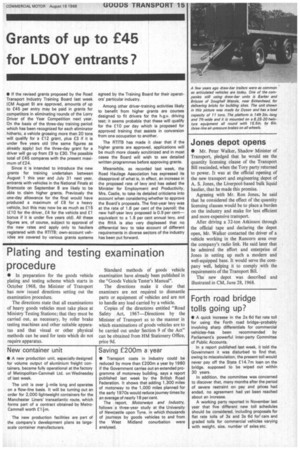Grants of up to £45 for LDOY entrants?
Page 17

If you've noticed an error in this article please click here to report it so we can fix it.
• If the revised grants proposed by the Road Transport Industry Training Board last week (CM August 9) are approved, amounts of up to £45 per entry may be paid in grants for competitors in eliminating rounds of the Lorry Driver of the Year Competition next year. On the basis of the three-day training period which has been recognized for each eliminator hitherto, a vehicle grossing more than 20 tons will qualify for a £12 grant, plus E3 if it is under five years old (the same figures as already apply) but the three-day grant for a driver will go up from £9 to £30. The possible total of £45 compares with the present maximum of £24.
Since it is intended to introduce the new grants for training undertaken between August 1 this year and July 31 next year, entrants with vehicles in the National Finals at Bramcote on September 8 are likely to be able to claim higher grants. Previously the one-day allowance for the final would have produced a maximum of E8 for a heavy vehicle, but this may now be as much as £15 (£10 for the driver,. £4 for the vehicle and £1 bonus if it is under five years old). All these figures are, of course, subject to approval of the new rates and apply only to hauliers registered with the RTITB: own-account vehicles are covered by various grants systems
agreed by the Training Board for their operators' particular industry.
Among other driver-training activities likely to benefit from higher grants are courses designed to fit drivers for the h.g.v. driving test; it seems probable that these will qualify for the £10 per day which is proposed for approved training that assists in conversion from one occupation to another.
The RTITB has made it clear that if the higher grants are approved, applications will be much more closely scrutinized and in most cases the Board will wish to see detailed written programmes before approving grants.
Meanwhile, as recorded last week, the Road Haulage Association has expressed its disapproval of what is, in effect, an increase in the proposed rate of levy and has asked the Minister for Employment and Productivity, Mrs. Castle, to take its detailed criticisms into account when considering whether to approve the Board's proposals. The first-year levy was at the rate of 1.6 per cent of the payroll; the new half-year levy proposed is 0.9 per cent— equivalent to a 1.8 per cent annual levy, and the RHA is also very displeased that no differential levy to take account of different requirements in diverse sectors of the industry has been put forward.




































































































